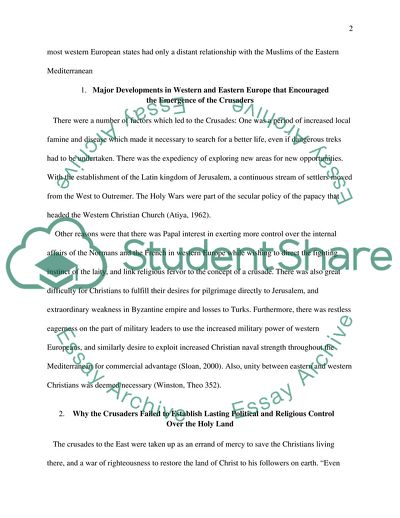Cite this document
(History of the Crusades Essay Example | Topics and Well Written Essays - 1500 words, n.d.)
History of the Crusades Essay Example | Topics and Well Written Essays - 1500 words. https://studentshare.org/history/1708369-what-major-development-in-western-and-eastern-europe-encouraged-the-emergence-of-the-crusadeswhy-did-the-crusaders-fail-to-establish-lasting-political-and-reli
History of the Crusades Essay Example | Topics and Well Written Essays - 1500 words. https://studentshare.org/history/1708369-what-major-development-in-western-and-eastern-europe-encouraged-the-emergence-of-the-crusadeswhy-did-the-crusaders-fail-to-establish-lasting-political-and-reli
(History of the Crusades Essay Example | Topics and Well Written Essays - 1500 Words)
History of the Crusades Essay Example | Topics and Well Written Essays - 1500 Words. https://studentshare.org/history/1708369-what-major-development-in-western-and-eastern-europe-encouraged-the-emergence-of-the-crusadeswhy-did-the-crusaders-fail-to-establish-lasting-political-and-reli.
History of the Crusades Essay Example | Topics and Well Written Essays - 1500 Words. https://studentshare.org/history/1708369-what-major-development-in-western-and-eastern-europe-encouraged-the-emergence-of-the-crusadeswhy-did-the-crusaders-fail-to-establish-lasting-political-and-reli.
“History of the Crusades Essay Example | Topics and Well Written Essays - 1500 Words”. https://studentshare.org/history/1708369-what-major-development-in-western-and-eastern-europe-encouraged-the-emergence-of-the-crusadeswhy-did-the-crusaders-fail-to-establish-lasting-political-and-reli.


